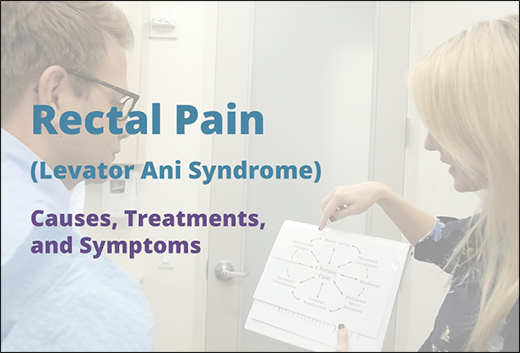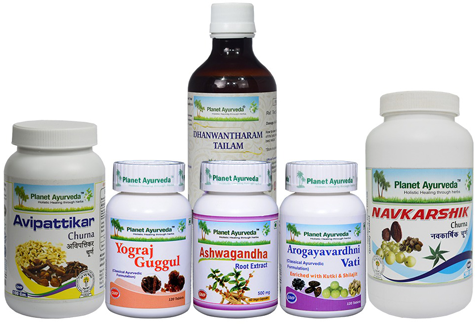Abstract
There are a number of syndromes or diseases mankind is suffering from. One of such conditions is levator ani syndrome, which occurs due to the spasm or twitching of the levator ani muscle. This results in burning sensation and pain in the rectal part. The pain occurs in episodes. The exact cause of the condition is unknown. In the text below, we shall discuss the condition caused by levator ani syndrome as well as its management in the contemporary system of medicine and traditional system of Ayurvedic medicine. Let's discuss!!

Introduction
Levator ani syndrome is characterised by tenesmus or painful burning sensation in the perineal or rectal area due to spasm of the muscle levator ani. It is a chronic condition characterised by episodic pain and burning sensation in the upper anal canal and rectum. The pain radiates to the hips, tailbone and other structures of the pelvic regions. There is no anatomical or structural abnormality or deformity present in the condition. The condition is only based on the recurring spasm of the levator ani muscle. In Ayurveda, the condition can be compared with the vata dosha and pitta dosha aggravation as the burning sensation is the feature of pitta dosha and the spasm is related to vitiated vata dosha. Further the condition can be related with guda stambh.
Causes Of Levator Ani Syndrome
- Exact cause of Levator Ani syndrome is unknown
- Inflammation of the pelvic area
- After child birth
- Surgery of the pelvic area
- Inflammation of the arcus tendon
Signs and Symptoms
- Irregular and spontaneous pain in the rectum
- Sensation of constant pressure on rectum and burning
- Pain is worse in sitting posture
- Pain worsens with prolonged sitting, stress, defecation, childbirth, surgery and sexual intercourse
- Tenderness on palpation of levator ani muscle
- Constipation
- Urinary incontinence and urgency to pass urine as well Dysuria
Investigations Required
- Stool sample
- Blood work
- Endoscopic and colonoscopy
- Imaging
Management of Levator Ani Syndrome
- Physical therapy
- Electrogalvanic stimulation
- Cyclobenzaprine
- Biofeedback
- Botox injections
Ayurvedic Management of Levator Ani Syndrome
Ayurveda, the life science, is a traditional system of Indian medicine. Ayurveda is based on the three basic principles known as doshas (Vata, Pitta, Kapha). Any imbalance in the dosha causes disorder and balance of the same is pronounced as health. In the condition of Levator Ani Syndrome, vata, kapha and pitta doshas are vitiated. The condition manifests itself with the painful and burning sensation in the rectum and perineal area. By pacifying the above mentioned vitiated dosha, there are a number of herbs that are useful in the levator ani syndrome. The condition can also be named 'guda stambh' as there is spasm of the levator ani syndrome which is characterised by painful and burning sensation in the rectum. Stambhan is the property of sheeta guna of vata dosha and kapha dosha and ruja (pain) is also related to vata dosha. Whereas the burning sensation is directly linked to the ushna guna (hot property) of pitta dosha. Hence as per the symptoms and the episodic spasm (stambhan) the condition of levator ani syndrome is best correlated with aggravated vata and pitta doshas.
The herbs amla (Emblica officinalis), haritaki (Terminalia chebula), bibhitaki (Terminalia bellerica) together pacifies all the three doshas thus is beneficial in levator ani syndrome, tulsi (Ocimum sanctum), yashtimadhu (Glycyrrhiza glabra), ashwagandha (Withania somnifera), giloy (Tinospora cordifolia), shankhpushpi (Convolvulus pluricaulis) etc. Some of the formulations that are known to pacify all the three dosha include Triphala churna, Dashmool kwath, Giloyghan Vati, Yashtimadhu Churna etc.
Herbal Remedies for Levator Ani Syndrome by Planet Ayurveda
Planet Ayurveda is an eminent GMP certified, ISO 9001:2015 certified,and US-FDA registered Ayurvedic Company, which adheres to the objective of manufacturing quality Ayurvedic products as mentioned in a number of ancient texts of Ayurveda. Formulations are manufactured without additives and preservatives and other kinds of chemicals or artificial flavouring agents which can have a number of side effects on the human body. Products manufactured at Planet Ayurveda are pure and devoid of any kind of adulteration. The products are purely organic and vegetarian and gluten free and halal certified. Planet Ayurveda extends some Ayurvedic herbal formulations for the management of the condition of Levator Ani Syndrome.
Following is the list of some herbal products that benefits the person suffering from Levator Ani Syndrome
- AVIPATTIKAR CHURNA
- YOGRAJ GUGGUL
- AROGYAVARDHINI VATI
- NAVKARSHIK CHURNA
- DHANWANTHARAM TAILAM
- ASHWAGANDHA CAPSULES
Products Description
1. AVIPATTIKAR CHURNA
Avipattikar Churna is blend of various herbs including haritaki (Terminalia chebula), bibhitaki (Terminalia bellirica), amalki (Emblica officinalis), nagarmotha (Cyperus scariosus), vidang (Embelia ribes), choti ela (Elettaria cardamomum), tejpatra (Cinnamomum tamala), lavang (Syzygium aromaticum), nishoth (Operculina turperthum) and marich (Piper nigrum). Avipattikar churna helps in almost every condition of the alimentary canal. Moreover it helps in conditions of constipation that can be a symptom or the aggravating factor of the levator ani syndrome. As Aipattikar churna manages the symptoms of the syndrome, thus it is helpful in the same.
Dosage: One tsp thrice a day 10 mins before a meal with warm water.
2. YOGRAJ GUGGUL
Yograj Guggul is a classical Ayurvedic proprietary formulation. It is a beneficial formulation in the problems related to the musculoskeletal system and neurological system. Yograj Guggul is made up of the herbs guggul (Commiphora mukul), amalaki (Emblica officinalis), bibhitaki (Terminalia bellirica), haritaki (Terminalia chebula), vidang (Embelia ribes), ela (Elettaria cardamomum), gokshur (Tribulus terrestris), shunthi (Zingiber officinale) etc. The herbs possess anti-inflammatory and detoxifying properties. As the formulation provides strength and support to the muscles which makes it an excellent preparation for Levator Ani Syndrome.
Dosage: Two tablets twice twice a day with lukewarm water after meals.
3. AROGYAVARDHINI VATI
Arogyavardhini vati is a classical Ayurvedic formulation that is used in almost every health condition as well as it is also helpful in maintaining general wellness. As the name of the formulation suggests, it helps in increasing the non diseased condition of the person which means it helps in keeping the person free of any health issues or ailments. Arogyavardhini vati is a blend of various herbs that balances the doshas and acts as a rasayana. The herbs include haritaki (Terminalia chebula), bibhitaki (Terminalia bellirica), amalki (Emblica officinalis), shuddha shilajit (Asphaltum), shuddha guggulu (commiphora mukul), chitrak mool (Plumbago zeylanica), kutki (Picrorhiza kurroa). Arogyavardhini vati balances all the three doshas. It is helpful in levator ani syndrome because of its dosha pacifying properties. Furthermore, as the name of the preparation suggests it helps in improving good health therefore it is useful in eliminating levator ani syndrome.
Dosage: Two tablets twice twice a day with lukewarm water after meals.
4. NAVKARSHIK CHURNA
Navkarshik Churna is a composed of a number of herbs including haritaki (Terminalia chebula), bibhitaki (Terminalia bellirica), amalki (Emblica officinalis), vacha (Acorus calamus), neem (Azadirachta indica), manjistha (Rubia cordifolia), kutki (Picrorhiza kurroa), giloy (Tinospora cordifolia), daruhaldi (Berberis aristata). The churna benefits the patient with Levator Ani Syndrome by its tridosha balancing properties. Furthermore, Navkarshik churna helps in removing aama dosha which can be a cause of unexplained spasm of the levator ani muscle.
Dosage: 1/2 tsp twice a day with warm water.
5. DHANWANTHARAM TAILAM
Dhanwantharam tailam is used in the condition of weak muscular power. The oil possesses strengthening and power providing properties of the herbs bala (Sida cordifolia), kiulatha (Dolichos biflorus), agnimantha (Clerodendrum phlomidis), prasarini (Paederia foetida), brihati (Solanum indicum), manjistha (Rubia cordifolia), sariva (Hemidesmus indicus) and others. The oil provides energy to the weak muscles. Furthermore, the oil preparation alleviates pain and pacifies vata dosha. As Dhanwantharam thailam reduces pain and provides strength to the muscles, therefore it is useful in levator ani syndrome.
Dosage: Apply locally after warming up the oil and then give hot fomentation over the muscular area.
6. ASHWAGANDHA CAPSULES
Ashwagandha capsules are enriched with the goodness of the herb ashwagandha (Withania somnifera) that possesses rasayana properties. The capsules pacify the vata dosha. And benefits in maintaining the good health of the neurological system. Ashwagandha possesses rasayan properties thus helps in overall management of the bodily functions. In this condition of Levator Ani Syndrome it helps by giving strength to the levator ani muscle. By pacifying the vata dosha it helps in spasmodic condition of the levator ani muscle. By its above said actions, Ashwagandha capsules are of greater benefit in the condition of levator ani syndrome.
Dosage: One capsule twice a day with plain water after meals.
Conclusion
As the condition is chronic and does not get well with time and gets worse with some postures. As there is no permanent cure available for Levator Ani Syndrome which makes it much worrisome. But Ayurveda has got some help to offer. Ayurvedic medicines work on the basis of vitiated dosha. By correcting the dosha imbalance, the condition is managed. In the case of Levator Ani Syndrome, the medicines work on correcting the pitta and vata imbalance. Furthermore, the medicines above provide strength to the muscles and improves overall tone and functioning of the muscles and boosts overall wellness and blesses with long, healthy and prosperous life.



No comments:
Post a Comment